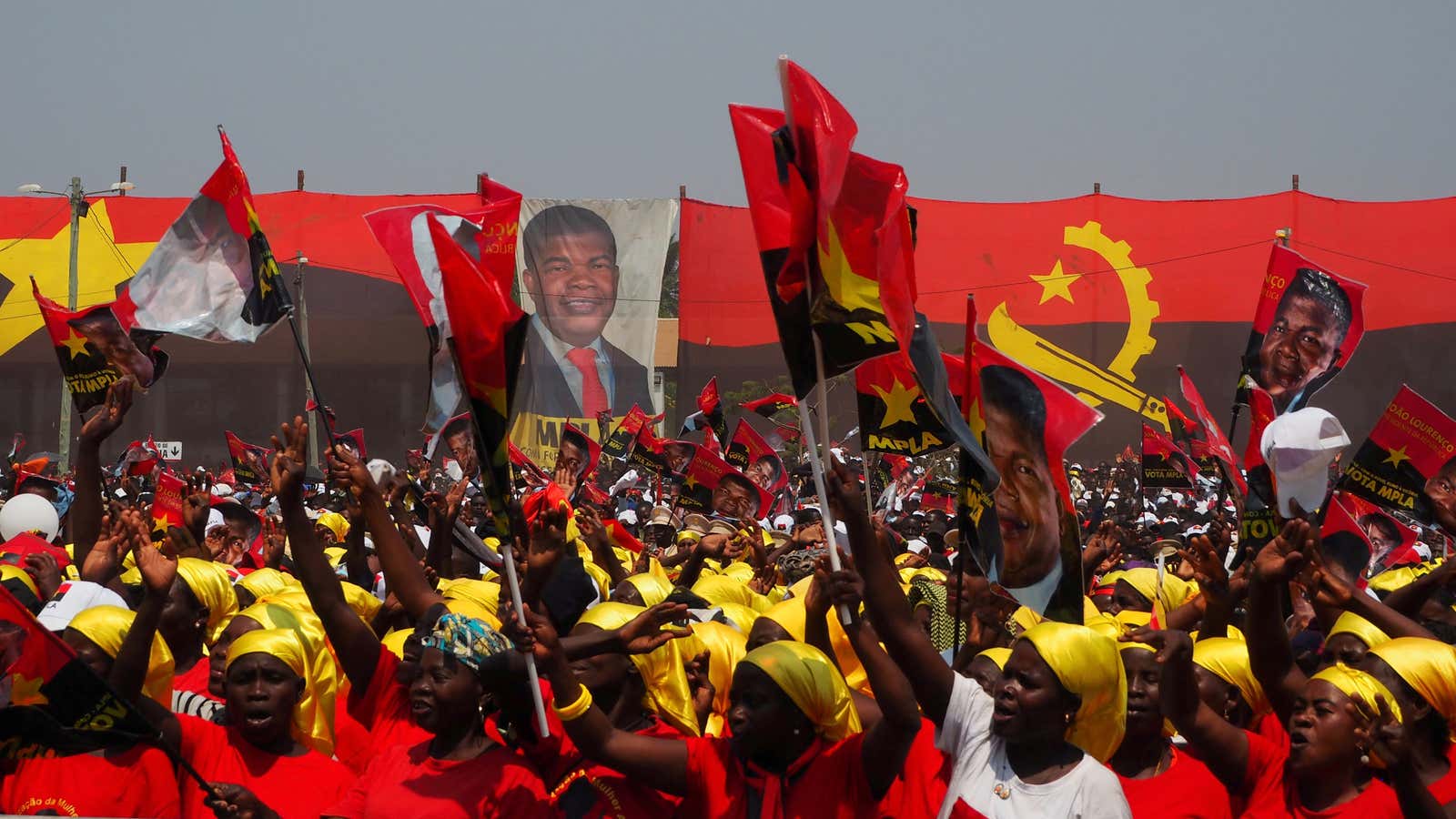For the first time in 38 years, Angola has someone new sitting in the seat of power.
On Aug. 25, the People’s Movement for the Liberation of Angola (MPLA) claimed yet another victory as the only leadership the country has known since independence in 1975. Since emerging from a 27-year-long civil war in 2002, the country has held three elections; each time, the MPLA has comfortably beaten its main opposition and former wartime foe, the National Union for the Total Independence of Angola (UNITA), each time with José Eduardo dos Santos at the helm. At the end of the 2017 elections, however, the MPLA had a new face on its black, red, and yellow victory banners.
João Lourenço is now Angola’s third president, after the MPLA secured 64.5% of the vote and the necessary parliamentary majority to pick the president. His predecessors were the deified Augostinho Neto and Africa’s second longest serving leader, dos Santos. Neto was the country’s poet, doctor, and founding president, while Dos Santos led for 38 years, through a brutal civil war that gave way to an oil boom and increasing accusations of authoritarianism and crippling cronyism.
Lourenço campaigned on the promise that he would lead the country in a new direction. His plan is to open the country’s economy to the world and reduce its dependence on the volatile oil price. He also wants to ensure that the infrastructure development that has turned around the capital Luanda reaches the rest of the country.
To salvage Angola’s corruption-worn reputation, the new president has already promised potential new international allies greater transparency than his predecessor. In an interview with the Washington Post while on a state visit to the US in May, Lourenço said he planned to limit public sector infrastructure projects, presumably to loosen the state’s grip on the country’s economy. In a bid to attract more private investment, his regime plans to introduce more private-public partnerships to diversify the economy.
Lourenço has also always wanted to lead. In the 1990s, dos Santos hinted at retiring but it was in fact a trap to weed out the overly-ambitious among his party. Lourenço fell for it and spent years in political purgatory, according to a profile by AFP. He clawed his way back, and is now deputy president of the MPLA.
Optimistically, Lourenço’s assent to Angola’s presidency could very well be a new dawn for the country. From the outside, Angola’s post-war boom has seemed to benefit only the dos Santos dynasty, and the political elite surrounding him.
Cynically, and perhaps more realistically, Lourenço could be more of the same. The former defense minister is a son of the revolution and a product of the party. Educated in the Soviet Union like dos Santos, the 62-year-old has never lived his adult life outside of the party. As part of Angola’s class of generals, he has almost unfettered access to the country’s mineral wealth—although his name has not yet been mentioned in any major scandals.
The party is where the real power lies in Angola. And, the MPLA president is none other than dos Santos. Dos Santos may have stepped away from the formal office of the Angolan presidency, but as head of the MPLA, he maintains control of the country’s political structure. On top of that, Angola’s parliament has created a new constitutional position of president-emeritus specifically for dos Santos, which will ensure he maintains the perks of the presidency, including immunity from prosecution.
The margin of victory may have been smaller for the MLPA this year than in previous elections, but it was still a victory, and a message to those who doubted the might of the party. UNITA has challenged the election results, claiming its own count of the votes doesn’t square with the official numbers—but the government has not responded. Meanwhile, in his victory note (link in Portuguese), JLo—as Lourenço is known in Angola—reiterated that the victory belonged to the MPLA. Lourenço’s political identity is inextricably linked to that of his party, and his rule will likely ensure that Angola remains the country of the MPLA.
